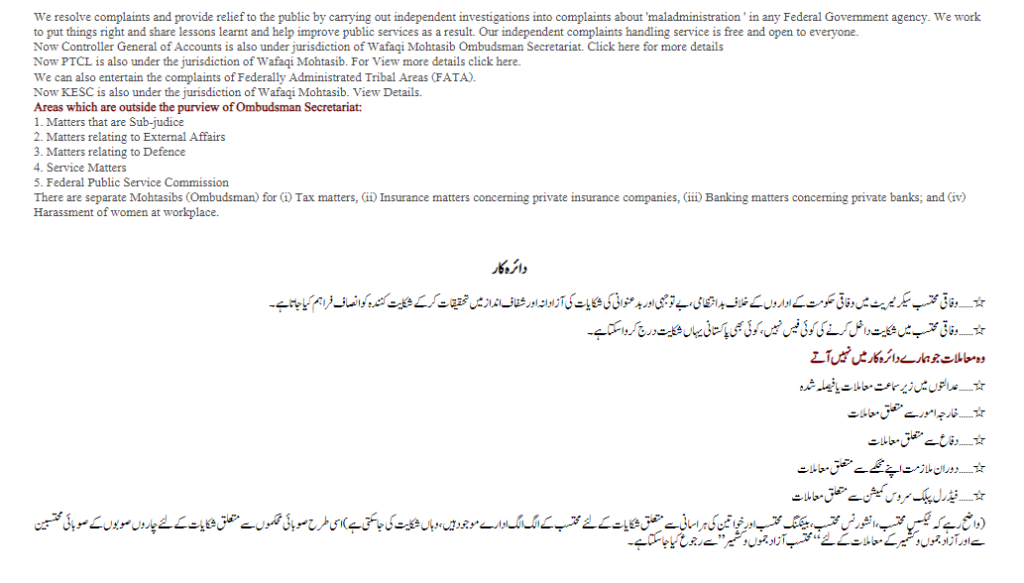Wafaqi Mohtasib (Ombudsman): Duties and Complaint Resolution Process

In today’s complex bureaucratic landscape, understanding your rights when faced with maladministration can be empowering. Whether you’ve encountered delays in government services, unfair treatment, or administrative negligence, the role of the Wafaqi Mohtasib (ombudsman) Secretariat وفاقی محتسب سیکر ٹیر یٹ becomes pivotal in seeking justice and ensuring accountability.
Introduction
Have you ever felt frustrated by bureaucratic red tape or unfair treatment by government Departments? Imagine a dedicated office that listens to your grievances impartially and works to correct administrative wrongs. This is precisely the role of the Wafaqi Mohtasib (ombudsman) Secretariat وفاقی محتسب سیکر ٹیر یٹ, an institution designed to ensure transparency, accountability, and fairness in public administration.
What is Maladministration?
Maladministration refers to the improper or negligent conduct of public affairs or the administration of justice. It involves actions or decisions by government officials or organizations that are unfair, unreasonable, or contrary to law or established rules. This term is often used in administrative law contexts to describe actions that result in injustice, inconvenience, or hardship to individuals or groups due to administrative errors, incompetence, bias, or lack of adherence to proper procedures. In many legal systems, there are mechanisms such as ombudsmen or administrative tribunals that address complaints of maladministration and seek remedies for those affected.
Evolution of Ombudsman Institutions
The ombudsman institution has a rich history, evolving from a Swedish concept into a global phenomenon. Ombudsmen play a crucial role in ensuring transparency, accountability, and fairness within various sectors, including government, finance, and insurance. This article explores the evolution of ombudsman institutions, highlighting their origins, development, and impact across different regions and sectors.
Origins in Sweden
The concept of the ombudsman originated in Sweden in the early 19th century. The first ombudsman, known as the Justitieombudsman, was established in 1809 to oversee the legal and administrative activities of public officials. This role was designed to protect citizens’ rights by investigating complaints and ensuring that government actions were lawful and just.
Spread to Other Nordic Countries
Following Sweden’s example, other Nordic countries adopted the ombudsman model. Finland established its Parliamentary Ombudsman in 1919, and Denmark followed with the creation of its ombudsman in 1955. These institutions were tasked with similar responsibilities, focusing on safeguarding citizens’ rights and promoting good governance.
Global Expansion
The success of the ombudsman in the Nordic countries prompted other nations to establish similar institutions. The concept spread across Europe, with countries like the United Kingdom, Spain, and Portugal creating their own ombudsman offices in the mid-20th century. The UK Parliamentary Commissioner for Administration, known as the Parliamentary Ombudsman, was established in 1967, marking a significant expansion of the institution outside the Nordic region.
Adoption in Commonwealth Countries
Commonwealth countries, influenced by the British model, also embraced the ombudsman concept. Pakistan, India, New Zealand, and Australia established their ombudsman institutions in the 1960s and 1970s. These offices aimed to address grievances against government agencies and ensure administrative justice.
Ombudsman in the Financial Sector
The 1980s and 1990s saw the expansion of the ombudsman role into the financial sector. Countries like the UK introduced the Financial Ombudsman Service in 2001, which provides a mechanism for resolving disputes between consumers and financial service providers. This development highlighted the adaptability of the ombudsman concept to various sectors beyond public administration.
Emergence in Insurance
The insurance industry also adopted the ombudsman model to address consumer complaints and disputes. The Insurance Ombudsman, established in many countries, ensures that insurance companies adhere to fair practices and that consumers have a platform to resolve their grievances. This institution has become vital in promoting transparency and accountability within the insurance sector.
Modern Developments
In recent years, the ombudsman institution has continued to evolve, adapting to new challenges and expanding its reach. Digitalization and globalization have influenced the role of ombudsmen, requiring them to address issues related to technology, data privacy, and cross-border disputes. Many countries have also established specialized ombudsman offices to handle specific areas such as health, education, and human rights.
Impact and Importance
The evolution of ombudsman institutions has significantly impacted public administration and various sectors. These institutions have enhanced transparency, accountability, and fairness, ensuring that citizens’ rights are protected and that grievances are addressed promptly. Ombudsmen have also played a crucial role in promoting good governance and strengthening democratic institutions.
Role and Responsibilities of Wafaqi Mohtasib (ombudsman) Secretariat وفاقی محتسب سیکر ٹیر یٹ
The Maladministration Mohtasib, also known as the Ombudsman, plays a critical role in ensuring public accountability and addressing complaints against government agencies and officials. The position is designed to protect citizens from any form of administrative injustice and inefficiency. Here are the primary roles and responsibilities of the Maladministration Mohtasib/Ombudsman:
1. Addressing Complaints
The Ombudsman is responsible for receiving and investigating complaints from individuals who believe they have been unfairly treated by government agencies or public officials. This includes instances of abuse of power, negligence, discrimination, and other forms of maladministration.
2. Investigating Maladministration
Upon receiving a complaint, the Wafaqi Mohtasib (ombudsman) Secretariat وفاقی محتسب سیکر ٹیر یٹ conducts a thorough investigation to determine if there has been any maladministration. This involves collecting evidence, interviewing relevant parties, and reviewing documents and records. The Ombudsman has the authority to summon witnesses and demand access to necessary information.
3. Recommending Corrective Actions
If maladministration is found, the Wafaqi Mohtasib (ombudsman) Secretariat وفاقی محتسب سیکر ٹیر یٹ can recommend corrective actions to the relevant government agency or official. These recommendations are aimed at rectifying the situation, compensating the complainant if necessary, and preventing similar issues in the future. While the Ombudsman’s recommendations are not legally binding, they carry significant moral and political weight.
4. Promoting Good Governance
The Ombudsman plays a proactive role in promoting good governance practices within public administration. This involves suggesting improvements to policies, procedures, and practices to enhance efficiency, transparency, and accountability in government operations.
5. Raising Public Awareness
Educating the public about their rights and the role of the Ombudsman is another key responsibility. The Ombudsman engages in outreach activities, publishes reports, and uses media channels to inform citizens about how they can seek redress for administrative injustices.
6. Reporting to the Government and Legislature
The Ombudsman regularly reports findings and recommendations to the government and legislature. These reports highlight systemic issues in public administration and suggest legislative or policy changes to address them. The Ombudsman also provides an annual report detailing the office’s activities, significant cases, and overall impact.
7. Ensuring Fair Treatment
One of the fundamental responsibilities of the Ombudsman is to ensure that all individuals receive fair treatment from public authorities. This includes safeguarding against discrimination, bias, and unequal treatment, and ensuring that public services are accessible to all segments of society.
8. Advising on Policy and Legislation
The Ombudsman may also advise the government on policy and legislative matters, particularly those related to administrative justice and public accountability. This advisory role helps shape policies that prevent maladministration and protect citizens’ rights.
9. Handling Specific Cases
In addition to general complaints, the Ombudsman may handle specific types of cases, such as those involving public procurement, corruption, and whistleblower protection. Each case is addressed with the same level of thoroughness and impartiality to uphold justice and accountability.
10. Collaborating with Other Oversight Bodies
The Ombudsman often collaborates with other oversight and regulatory bodies to address complex cases of maladministration. This collaboration ensures a comprehensive approach to resolving issues and strengthens the overall system of checks and balances in public administration.
Types of Complaints Handled
From issues related to pension delays to unfair treatment in healthcare, the Maladministration Mohtasib/Ombudsman handles a wide array of grievances. Common complaints include bureaucratic delays, arbitrary decisions, lack of transparency, and inadequate service delivery.
How to File a Complaint
Filing a complaint with the Maladministration Mohtasib/Ombudsman is straightforward. Individuals can submit their grievances either online, by mail, or in person. It’s essential to provide detailed information and supporting documents to facilitate a thorough investigation.
Investigation Process
Upon receiving a complaint, the Maladministration Mohtasib/Ombudsman initiates an investigation. This involves gathering evidence, interviewing relevant parties, and assessing whether administrative actions were fair, reasonable, and in accordance with established policies.
Case Resolution and Recommendations
After careful consideration of the facts, the Maladministration Mohtasib/Ombudsman issues recommendations aimed at rectifying any identified administrative deficiencies. These recommendations may include policy changes, procedural improvements, or compensation for aggrieved parties.
Impact and Benefits
The impact of Maladministration Mohtasib/Ombudsman interventions can be profound, leading to improved public trust, streamlined government processes, and enhanced service delivery. By holding officials accountable, these institutions contribute to a fairer and more responsive governance framework.
Limitations and Challenges
Despite their significant role, Maladministration Mohtasib/Ombudsman offices face challenges such as limited jurisdiction, resource constraints, and bureaucratic resistance. Addressing systemic issues often requires sustained advocacy and legislative support.
File Online Complaint In Wafaqi Mohtasib (ombudsman) Secretariat وفاقی محتسب سیکر ٹیر یٹ
To file online complaint fill in your complete details in the form below. To file the complaint collect all the relevant documents related to the complaint. You can hire the lawyer to represent you in the case and prepare complaint for you.

Conclusion
In conclusion, the Wafaqi Mohtasib (ombudsman) Secretariat وفاقی محتسب سیکر ٹیر یٹ serves as a beacon of hope for individuals navigating bureaucratic challenges. By providing a mechanism for redressal and accountability, these institutions uphold the principles of fairness and transparency in public administration.
FAQs
What should I do if I’m not satisfied with the Ombudsman’s decision? If dissatisfied, you may appeal to President of Pakistan through prescribed channels or seek legal advice for further recourse.
What qualifies as maladministration? Maladministration includes instances of administrative negligence, delay, bias, or procedural irregularities that cause harm or injustice.
How long does it take to resolve a complaint? The time taken varies based on the complexity of the case and cooperation from involved parties. Typically, simpler cases are resolved faster.
Can the Maladministration Wafaqi Mohtasib (ombudsman) Secretariat وفاقی محتسب سیکر ٹیر یٹ enforce decisions? yes they can enforce decisions, their recommendations hold significant persuasive power and often lead to corrective actions by authorities.
Is filing a complaint with the Wafaqi Mohtasib (ombudsman) Secretariat وفاقی محتسب سیکر ٹیر یٹ ? Yes, filing a complaint is usually free of charge. The office is funded by the government to provide impartial services to the public.

